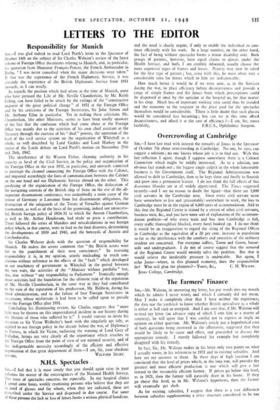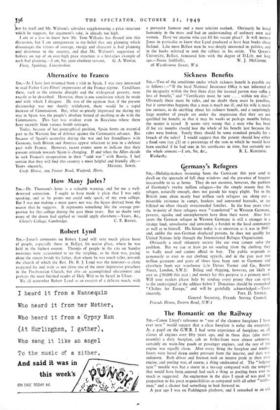The Farmers' Finance
SIR,—Mr. Walston, in answering my letter, has put words into my mouth which he admits I never wrote, and which I certainly did not mean. May I make it completely clear that I have neither the experience, the data nor the yardstick to know whether British agriculture as a whole is either at half cock or overpaid. And I am sure that, if Mr. Walston will re-read my letter (an advance copy of which I sent him as a matter of courtesy), he will agree that I was careful not to express or imply an opinion on either question. Mr. Walston's article put a hypothetical case of both questions being answered in the affirmative, suggested that they would be likely to be cause and effect, and proceeded to discuss the appropriate remedy. I merely followed his example but completely disagreed with his remedy.
In fact, Sir, Mr. Walston makes in his letter only two points on what I actually wrote, in his references to 1921 and to existing subsidies. And here are my answers to them. In these days of high taxation I ant convinced that the level of prices which, in the long run, will provoke the greatest and most efficient production is one which will give a fair reward to the reasonably efficient farmer. If prices go below this level, as in 1921, then the farmer will naturally draw in his horns. If they go above this level, as in Mr. Walston's hypothesis, then the farmer will eventually get slack.
As for existing subsidies, I suggest that there is a vast difference between subsidies supplementing a price structure considered to be too
liow by itself and Mr. Walston's subsidies supplementing a price structure which he suggests, for argument's sake, is already too high.
I am at a loss to know how Mr. Tom Williams has floated into this discussion, but I am unregenerate in my belief that any planning which discourages the virtues of courage, energy and character is bad planning and disastrous to the country, and that Mr. Walston's suggestion of bribery on top of an over-high price structure is a first-class example of
such bad planning.—! am, Sir, your obedient servant, G. A. WORTH. Fleet, Spalding, Lincolnshire.



































 Previous page
Previous page